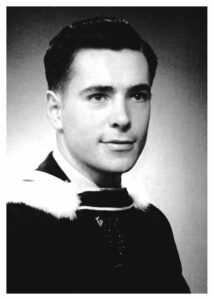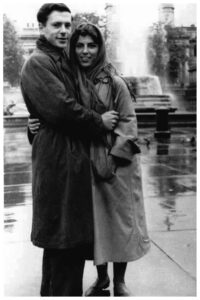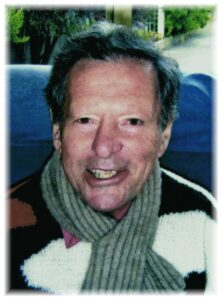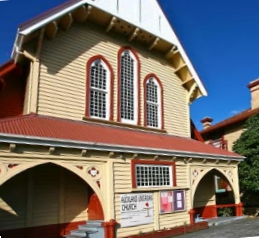 Lincoln Ashton Gribble (March 12, 1930-August 8, 2012) came from a family long associated with Unitarianism. From an early age he harbored the desire to become a Unitarian minister, a goal he finally reached after schooling at Manchester College in Oxford, England. When he returned home to New Zealand, circumstances led him to follow a dual career in education and the ministry.
Lincoln Ashton Gribble (March 12, 1930-August 8, 2012) came from a family long associated with Unitarianism. From an early age he harbored the desire to become a Unitarian minister, a goal he finally reached after schooling at Manchester College in Oxford, England. When he returned home to New Zealand, circumstances led him to follow a dual career in education and the ministry.
Lincoln was the first son in a family of two boys and two girls. As an infant, his parents Horace and Avis Gribble had him dedicated at the Auckland, New Zealand Unitarian Church by Wilna Constable (1888-1966). Wilna, the first woman minister at the Auckland Church and the first woman minister in New Zealand, co-ministered with her husband William. Lincoln’s grandfather William Gribble (1858-1939) had been the organist and choir master, while his father—an accomplished tenor and concert singer—and several aunts were members of the church during William Jellies’ ministries. Lincoln’s mother Avis was Anglican.
Gribble was schooled at Whangarei Boys High, north of Auckland. Reflecting on his early religious beliefs he wrote, “As a quiet and sensitive youngster I kept such information [about my dedication] secret to myself.” He attended Sunday school at the local Methodist Church with his brothers and sisters so he hid his views, “especially my interest in Unitarianism and my intention to become a minister. There was nothing I felt I could do with it until I came as an 18 Year old to study at Auckland University and to attend [the Auckland Unitarian] church…”
Gribble joined the church in 1948 and was active in the youth group, study circle, and discussion group. He developed a close friendship with Ellis Henry Morris (1897-1973), the minister at Auckland. Morris encouraged Gribble to pursue the ministry as did William Jellie (1865-1963), the minister emeritus of the Auckland Unitarian Church. Jellie also nurtured Gribble’s ambition to attend Manchester College in Oxford, England, United Kingdom.
Armed with an MA with honors in English from Auckland University, where his thesis was on “Sixteenth-century Religious Lyrics” and having received an Exhibition (grant or financial award) to attend Manchester College, Gribble set sail for England in 1952 on the SS Largs Bay. The beginning was inauspicious as the shipping company had left his baggage behind and the elderly ship broke down for 10 days en route.
 In his first year at Manchester College, Oxford (which changed its name to Harris Manchester College when it became a chartered college of Oxford University in 1996) Gribble won the Mansfield Evans Prize in Philosophy for his essay on “The Relation between Religion and Science.” Part way through his theology studies Gribble decided to also read for a Bachelor of Letters degree with St. Catherine’s College in Oxford, England (which became a residential college in 1962), studying the Psychology of Religion. However the demands of two course loads proved too much and he withdrew from this degree in the following year. After completing his theological studies in 1955 he made plans to study religious education at St. Lawrence University in Canton, New York before returning to New Zealand. While staying in London at the hostel of the International Voluntary Service for Peace he met Dolores Micallef. He was applying for an American visa, she was intending to return to Malta. They married in 1956 and stayed on in England.
In his first year at Manchester College, Oxford (which changed its name to Harris Manchester College when it became a chartered college of Oxford University in 1996) Gribble won the Mansfield Evans Prize in Philosophy for his essay on “The Relation between Religion and Science.” Part way through his theology studies Gribble decided to also read for a Bachelor of Letters degree with St. Catherine’s College in Oxford, England (which became a residential college in 1962), studying the Psychology of Religion. However the demands of two course loads proved too much and he withdrew from this degree in the following year. After completing his theological studies in 1955 he made plans to study religious education at St. Lawrence University in Canton, New York before returning to New Zealand. While staying in London at the hostel of the International Voluntary Service for Peace he met Dolores Micallef. He was applying for an American visa, she was intending to return to Malta. They married in 1956 and stayed on in England.
In 1957, Gribble was inducted into a joint pastorate with the Memorial Church, Wallasey and Matthew Henry’s Chapel, Chester; two Liverpool area congregations. The charge was given to him by his old Auckland minister, Ellis Henry Morris. By now Gribble had met Will Hayes (1890-1959) or “Brother John” as he was known, at his Church of the Great Companions, with its meeting place at Chatham Unitarian Church. Something of a radical pacifist, Hayes had been leader of the Free Religious Movement in London. Gribble visited Chatham during his holidays and conducted a service. Will Hayes appreciated the greatness of Gandhi and taught a Universalist religious view which Gribble readily adopted. This breadth of vision would remain with Gribble for the rest of his life. In his final year in England he obtained a position as residential housemaster at Swalcliffe Park School for emotionally disturbed boys in Oxfordshire. Lincoln thrived in this new position and became attracted to education. By the time they returned to New Zealand in December 1960, the Gribbles had three children, a boy and two girls.
There was no vacancy at his old Auckland church so he took a position as a secondary school teacher. While following this new career over the next thirty years—one that he was to enjoy and excel at—he continued to provide ministerial support to the Auckland church, in effect working as a dual professional.
He held teaching positions at Warkworth District School, 1961-1964; and at Motueka High School,1964-66, where he was head of French. The family moved to Fiji and between 1967-1970 Lincoln taught at Queen Victoria School and the University of the South Pacific. He returned to New Zealand as head of English to Dannevirke High School and then went to a Maori boys boarding school, Te Aute College, in 1981 as House Master and head of English. He had recently completed an MPhil in education at Massey University with a thesis on “The Language of the mottos of New Zealand secondary schools.” His teaching career continued until 1990.
Throughout this time he provided occasional supply to the Auckland Unitarian Church, participated as a key speaker at Unitarian conferences, and led services when various celebrations occurred in the life of the church. As secretary of the New Zealand Unitarian Association, 1962-64, Lincoln worked as associate editor on the national Unitarian journal Motive. In 1963 when his old friend William Jellie died, it was Gribble who conducted the funeral service at the Auckland Unitarian Church.
 Describing his Unitarianism, in a radio talk in 1967, Gribble said he saw salvation in, “regarding each other as brothers and sisters… we must help each other, love each other, forgive each other.” And he went on, “We [must] try to be tolerant of each other, to respect each other’s viewpoint, to understand each other as far as possible.” In 1980 he gave the keynote address at the Australian and New Zealand Unitarian Conference. In his address he spoke of the tragic loss of their only son Roy: “Dolores and I have come to this Conference in urgent need of you all, in need of the strength and comfort of your love and caring. We urgently need warm Unitarian fellowship in the bleakness of our bereavement.” The eightieth anniversary celebration of the Auckland Unitarian Church in 1981 was led by Gribble: He described this church as “my spiritual home.” He was also a significant participant when the Australian and New Zealand Unitarian Conference was held in Auckland in 1989.
Describing his Unitarianism, in a radio talk in 1967, Gribble said he saw salvation in, “regarding each other as brothers and sisters… we must help each other, love each other, forgive each other.” And he went on, “We [must] try to be tolerant of each other, to respect each other’s viewpoint, to understand each other as far as possible.” In 1980 he gave the keynote address at the Australian and New Zealand Unitarian Conference. In his address he spoke of the tragic loss of their only son Roy: “Dolores and I have come to this Conference in urgent need of you all, in need of the strength and comfort of your love and caring. We urgently need warm Unitarian fellowship in the bleakness of our bereavement.” The eightieth anniversary celebration of the Auckland Unitarian Church in 1981 was led by Gribble: He described this church as “my spiritual home.” He was also a significant participant when the Australian and New Zealand Unitarian Conference was held in Auckland in 1989.
Two English Unitarian ministers, Arthur Vallance (1902-1990) and his wife Elspeth Vallance (nee Hall, 1915-2009) retired to Blenheim, New Zealand, in 1985. Arthur was past president of the General Assembly of Unitarian and Free Christian Churches in the UK. When he died, Gribble traveled to Blenheim and conducted the funeral service. Linda Moss and her husband, Max Landau Moss, who came from America, had jointly ministered at the Auckland Unitarian Church starting in 1990. When Linda Moss died in 1996, Gribble came to Auckland as the acting minister and stayed for four months, providing leadership and support for the grieving congregation, including the widowed husband. Again in 1998 at the centennial celebrations of the church it was Gribble who gave the sermon. His final sermon at the Auckland church was in December 2005.
Gribble’s contribution to New Zealand Unitarianism was unique in many ways, not least because he was the last New Zealander trained for the ministry at Oxford.
Our Church
Poem for the 90th anniversary of the Auckland Unitarian Church building, 1991
and I had thought
a house made
but with hands
was unfit temple —
too lowly for the likes of us
proud partakers of
God’s eternal spirit
 yet I have learned with time
yet I have learned with time
to see this church as wharenui-
meeting-house
nurse-nourisher
enfolder of my forbears
and myself and others
drawn to the same altar-chalice
home, rather;
home of the free
fashioned by the free
for the free
hearth and beacon
for faith and knowledge
sensing and rejoicing
in the imperishable dignity
and sacredness of life
in all
its amazing forms
Gribble’s student records are in the student archives of Harris Manchester College, Oxford, England. Biographical information can be found in a number of articles written by Lincoln Gribble including; “A Member’s View,” Auckland Unitarian Church News & Views (April 1988); “The Unitarians,” Motive (June 1968); “A Beckoning Future,” in Celebrating Our First One Hundred Years, A commemorative edition of Motive (March 1998); “Liberal Religion in the Eighties,” Unitarian Quest (April-September 1980); and the sermon, “Black and White or Colour,” Auckland Unitarian Church News & Views (September 1981). A copy of a July 1952 letter from William Jellie to Lincoln Gribble is held by Wayne Facer.
Article by Wayne Facer
Posted May 2, 2014